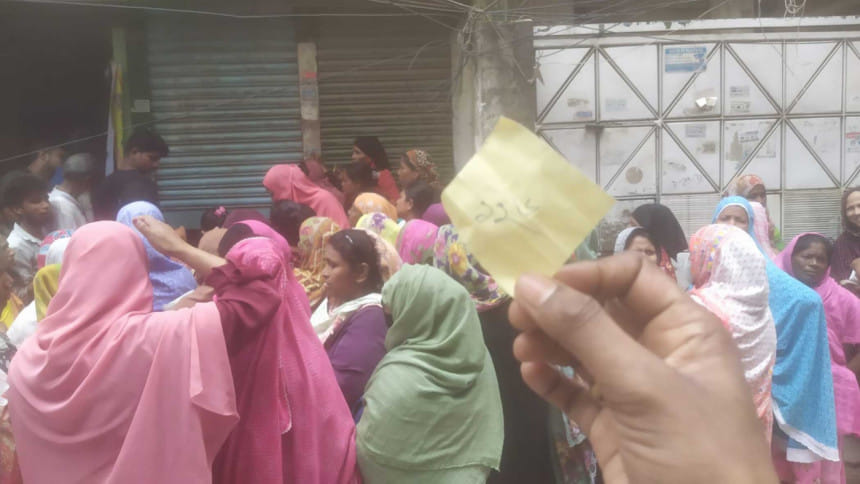Lines that lead to nowhere

Last Friday, Nargis queued in front of the TCB shop in East Shewrapara around 6:00am, hoping to secure a serial that would allow her to purchase subsidised products on Sunday. After waiting for five hours, she was finally handed serial number 126 around 11:00am.
The 28-year-old is the sole earner of her four-member household. Her husband abandoned her after remarrying. Nowadays, Nargis struggles to feed her three daughters, despite working as a househelp in four different homes.
Having secured the serial, Nargis returned home in good spirits on Friday.
Then, on Sunday, she once again queued in front of the shop around 6:00am. However, this time she was standing behind 200-300 other people who had started the line around 1:00am. When the shop finally began selling the products around 10:30am, Nargis started getting calls from her employer to come start her work.
Unable to convince them over the phone, she asked another person to hold her place in line while she spoke to her employers. In the ten minutes it took for her to go and come back, her place was lost and she had to queue all over again.
Finally, around 3:00pm, the TCB shop had run out of all their products. Nargis, joined by two of her daughters, had only the slip with 126 written on it and no commodities.
Heartbroken by the chain of events, Nargis sat on the ground and began crying. She called out to the shop and showed her serial, but all the goods were already sold out.
Seeing their mother crying, the two young girls also began tearing up.
Having spent around 14 hours standing in queue, over two days, Nargis could do nothing but cry at the circumstances.
Even worse was the fact that because she spent so long in the line, she had not cooked any lunch for her children that day.
Like Nargis, 200 others shared a similar fate, as they were unable to secure products from the TCB shop.
Speaking to The Daily Star, Nargis said, "I was really in need of these items. This opportunity comes only once a month and I failed to secure it. I would have been able to save around Tk 300 if things had worked out."
"Normally, I can stretch out the 2kg of lentils and 2 litres of oil for the entire month. So, this has been a big loss for me," she added, still crying.
Jalal Uddin, a rickshaw puller, began queuing around 11:00am but failed to secure the goods.
"If I pulled my rickshaw instead of staying in this line, I could have earned Tk 150-200. But now I have missed out on both," he said, a look of sadness overcoming his face.
Speaking to the people there, this correspondent learned that many people had made multiple purchases from the shop, despite each purchase requiring an NID number.
Some locals stated that the system needs to be changed. Messages should go out to only those who fall within the income brackets eligible for the TCB. Additionally, if a time period is stated rather than a serial number, it will be very beneficial, they added.
They also added that some people from middle-income groups -- who are not eligible for the service -- often come to the TCB shops to secure a good deal.
Having observed numerous TCB shops across the capital, this correspondent notes that there is a pattern of no serial being maintained.
Contacted, TCB shop agent Munir Hosain said, "We sold items to 750 people. Each package contains 2 kg of lentils, 2 litres of soybean oil and 5 kg of rice. Normally, we give it on a first come, first serve basis." In this TCB shop, they sell 2 kg of lentils at Tk 120, 2 litres of oil at Tk 200, and 5 kg of rice at Tk 150.
Speaking to the people who received the products, they shared that while it only saves them around Tk 300, it can often make the difference between whether they can eat that night or not.


 For all latest news, follow The Daily Star's Google News channel.
For all latest news, follow The Daily Star's Google News channel. 



Comments